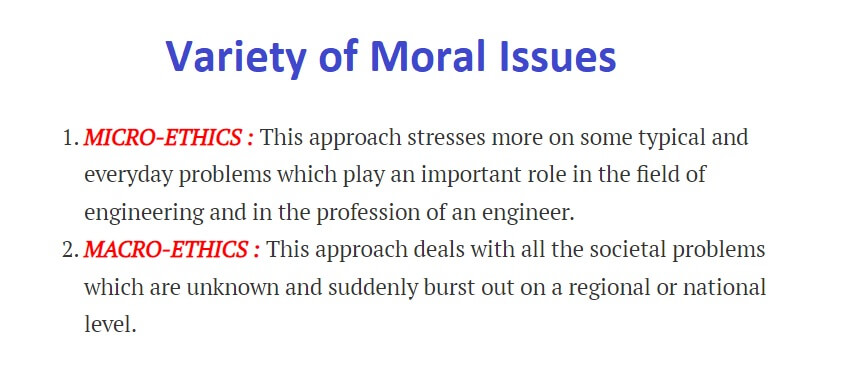Variety of Moral Issues
There are so many engineering disasters which are greater/ heavier than the level of acceptable or tolerable risk. Therefore, finding and avoiding such cases such as nuclear plant accident at Chernobyl (Russia), Chemical plant accident at Bhopal (India) where a big disaster of gas leakage, occurred in 1980, is necessary.
In the same way, oil spills from some oil extraction plants (the Exxon Valdez plant), hazardous waste, pollution, natural disasters like floods, earth quake and danger from using asbestos and plastics are some more cases of engineering disasters. These fields should be given awareness of engineering ethics.
Hence, it is essential for engineers to get awareness on the above said disasters. They should also know the importance of the system of engineering.
When malfunction of the system is a rapid one, the disaster will be in greater extent and can be noticed immediately. When they are slow and unobserved, the impact is delayed. So, the engineers should not ignore the functions of these systems.
These cases also explain and make the engineers to be familiar with the outline of case in future and also about their related ethical issues.
Approaches to Engineering Ethics
- MICRO-ETHICS : This approach stresses more on some typical and everyday problems which play an important role in the field of engineering and in the profession of an engineer.
- MACRO-ETHICS : This approach deals with all the societal problems which are unknown and suddenly burst out on a regional or national level.
So, it is necessary for an engineer to pay attention to both the approaches by having a careful study of how they affect them professionally and personally. The engineers have to acquaint themselves with the everyday problems both from personal and societal point of view.
Where and How do Moral Problems Arise in Engineering?
Any product or project has to undergo various stages such as planning, idea, design, and manufacturing which is followed by testing, sales and services. This has to be done by engineers of various branches like Civil, Mechanical, Electrical, Chemical etc. These engineers may be grouped together as a team or they may be separated from each other with an interconnection or co-ordination.
Inspite of the engineers’ full attention and care, sometimes the product or project may be unsafe or less useful. This may be due to some reasons : – the product or project may be designed for early obsolescence; or under pressure because of running out of time, budget etc; or by ignorance, of the size of the project, or because of the large number of products sold on the mass market, people may be affected.
Some cases with which different areas are covered by engineering ethics:
- An inspector finds a faulty part in the manufacture of a machine, which prevents the use of that machine for a longer period. But his superior, takes this as a minor mistake and orders that the faulty part be adjusted so that the delay in the process can be avoided. But the inspector doesn’t want this and so he is threatened by the supervisor.
- An electronic company applies for a permit to start a Nuclear Power Plant. When the licencing authority comes for visit, they enquire the company authorities on the emergency measures that have been established for safety of the surroundings. The engineers inform them about the alarm system and arrangements that have been made in local hospitals for the treatment of their employee’s they have no plan for the surrounding people. They also inform that it is the responsibility of the people.
- A Yarn Dyeing company dumps its wastes in the nearby river. It causes heavy damage to the people who are using the river. The plant engineers are aware of this, but they do not change the disposal method because their competitors are also doing similarly as it happens to be cheaper. They also say that it is the responsibility of the local government.
The above given examples clearly explain how the ethical problems arise most often because of wrong judgements and expectations of engineers. These necessitate establishing some codes of conduct which have to be imposed on engineers’ decisions on the basis of ethical view.
| Read More Topics |
| Sense of engineering ethics |
| Strategies for developing confidence |
| Management planning principles |
| Characteristics of quality leaders |





